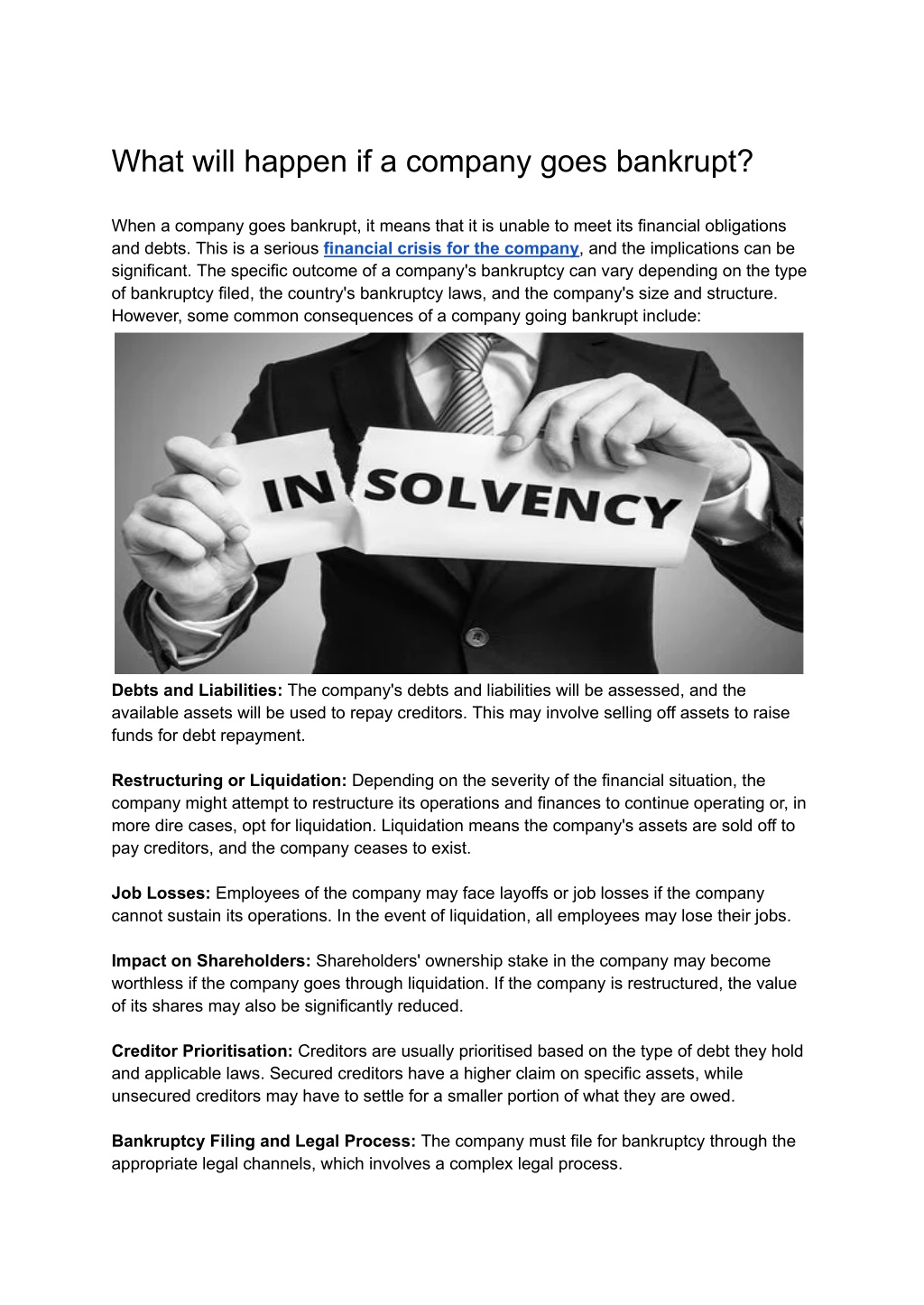If a Company Goes Into Administration, What Happens to Staff Payments and Redundancy? An Overview for Administration Staff
If a Company Goes Into Administration, What Happens to Staff Payments and Redundancy? An Overview for Administration Staff
Blog Article
The Influence of Company Liquidation on Worker Civil Liberties, Payment, and Work Stability
In the world of corporate dynamics, the dissolution of a company due to liquidation can cast a darkness of uncertainty over the destiny of its workers. Comprehending the ins and outs of exactly how company liquidation affects employees is important for browsing the complexities that emerge in such scenarios.
Legal Defenses for Workers
Lawful Protections for Staff members make sure that workers' civil liberties are safeguarded and supported in the event of firm liquidation. These defenses offer as a vital safety and security internet for employees dealing with unpredictabilities due to their employer's financial difficulties. One fundamental security is the Employee Modification and Retraining Notice (WARN) Act, which calls for companies with over 100 employees to offer development notice of at least 60 days prior to a plant closing or mass layoff.
Additionally, the Fair Labor Requirement Act (FLSA) mandates that workers must get their last paycheck quickly upon discontinuation, including any accumulated getaway time or bonuses. This regulation intends to prevent companies from withholding compensation owed to workers throughout the liquidation procedure. The Employee Retirement Earnings Safety Act (ERISA) safeguards employees' retirement funds by setting requirements for personal pension strategies and making sure that these funds are secure, also in the occasion of a company's bankruptcy.
Impact on Payment Packages
Amid company liquidation, the restructuring of compensation plans typically leads to considerable adjustments for staff members. When a firm goes right into liquidation, staff members are faced with the possible loss or reduction of various parts of their settlement plans, such as benefits, profit-sharing, and stock options. In a lot of cases, outstanding payments for overtime, unused vacation days, or other advantages might also go to risk as a result of the financial constraints faced by the firm throughout the liquidation procedure.
In addition, the discontinuation of employment agreement throughout liquidation can bring about disagreements over severance pay and various other types of settlement that workers are qualified to under their contracts or neighborhood labor regulations. Employees may discover themselves in a perilous scenario where they have to work out with liquidators or trustees to secure reasonable payment for their years of solution to the firm.
Task Protection Worries
Throughout company liquidation, workers often deal with enhanced task security issues as the future of their settings becomes unsure. The prospect of losing their work as a result of the closure of the business can produce substantial stress and anxiety amongst employees. Work protection concerns during liquidation are aggravated by the lack of clearness relating to the timeline of the process, prospective redundancies, and the total security of business.
Employees might bother with their economic stability, career leads, and the schedule of similar task chances in the market. Uncertainty surrounding the liquidation procedure can lead to reduced efficiency, morale, and job contentment among workers. Furthermore, the concern of job loss can influence staff members' psychological health and wellness and health.
Employers are urged to communicate honestly and transparently with employees throughout the liquidation procedure to address task safety issues. Supplying routine updates, using support solutions, and discovering alternative job options can help minimize some of the anxieties employees may experience during company liquidation. By prioritizing staff member well-being and maintaining clear interaction, companies can minimize the unfavorable effect of task security problems throughout this difficult period.
Employee Insurance Claims and privileges

Staff members are normally qualified to receive unsettled incomes for a specified period prior to the liquidation, which might vary by nation. Furthermore, redundancy settlements are often available to employees that are made redundant as a result of the liquidation process.
Techniques for Navigating Unpredictability
In times of company liquidation, workers can utilize strategic techniques to browse via unpredictability and secure their entitlements and legal rights efficiently. Keeping abreast of the liquidation process, understanding their legal rights under labor legislations, and seeking legal guidance if necessary can equip staff members to make enlightened decisions.
A critical relocation for staff members is to prioritize their monetary protection. This can include exploring choices such as requesting overdue salaries via federal government systems, comprehending the hierarchy of lenders to examine the probability of receiving impressive repayments, and developing an individual budget plan to handle funds throughout the transition duration. Updating resumes, enhancing skills via training programs, and proactively looking for alternative work can aid employees protect their future past the liquidated company.

Conclusion
In conclusion, company liquidation can have substantial effects on staff member legal rights, payment, and work stability. Employee concerns about work security and payment packages should be attended to within the lawful structure to make certain reasonable therapy and ideal payment.

When a firm goes right into liquidation, workers are faced with the possible loss or decrease of different parts of their compensation bundles, such as benefits, profit-sharing, and stock choices.Throughout company liquidation, employees often deal with heightened work security problems as the future of their settings ends up being unpredictable. Providing routine updates, providing assistance solutions, and checking out different work alternatives can assist relieve some of the anxiousness staff members may experience throughout company liquidation.In verdict, company liquidation can have substantial implications on employee rights, compensation, and task security.
Report this page